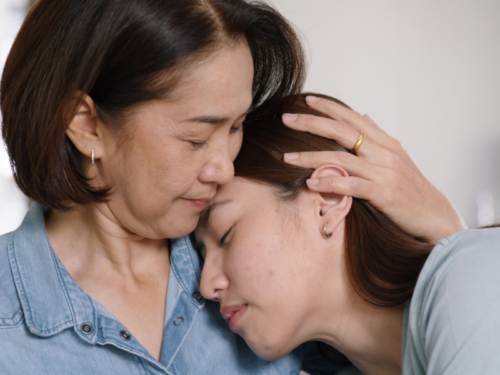
Table of Contents
Treatment-Resistant OCD May Be Why Your OCD Symptoms Won’t Improve

Written By: Ashley Laderer

Clinically Reviewed By: Dr. Don Gasparini
November 22, 2023
10 min.
If your OCD symptoms don’t go away despite treatment, you might have treatment-resistant OCD. Here’s what you need to know.
Learn more about our Clinical Review Process
Table of Contents
Obsessive-compulsive disorder (OCD) is a mental health condition that consists of persistent obsessions, unwanted intrusive thoughts, and compulsions. These obsessive thoughts and compulsions can seriously interfere with quality of life and functioning—especially in those with treatment-resistant OCD.
According to the American Psychiatric Association, about 2 to 3% of people in the US have OCD. Many OCD sufferers find significant relief through therapy and, in some cases, psychiatric medications. However, recovery may seem a bit more out of reach for those who don’t experience improvement from initial treatments. This is known as treatment-resistant OCD. Below, we delve further into symptoms of treatment-resistant OCD and explore if there’s, in fact, a treatment option that works for the condition.

Healing from treatment-resistant OCD is possible
We provide personalized care for serious mental health conditions.
What is treatment-resistant OCD?
As the name suggests, treatment-resistant OCD is when the disorder sticks around despite treatment, leaving treatment-resistant patients with stubborn OCD symptoms that continue to interfere with quality of life and functioning.
“Treatment-resistant OCD refers to cases where individuals with OCD do not respond satisfactorily to standard treatment options such as pharmacotherapy or evidence-based psychotherapy,” says Lindsay McGovern, a licensed clinical social worker specializing in OCD. She says the first-line treatment options for OCD are typically medications called selective serotonin reuptake inhibitors (SSRIs) and cognitive behavioral therapy (CBT) using the exposure and response prevention (ERP) model. However, for some, first-line therapy and SSRI treatment won’t help alleviate symptoms, likely indicating a case of treatment-resistant OCD.
What causes treatment-resistant OCD?
Even in cases where OCD is not treatment-resistant, it can still be tricky to treat and find full relief. “OCD can be difficult to treat because of the complex nature of the disorder,” McGovern says. “It is a psychological disorder characterized by persistent, intrusive, and distressing thoughts (obsessions) and repetitive behaviors or mental acts (compulsions) designed to neutralize the anxiety caused by the obsessions. The combination of anxiety and compulsions can make OCD treatment challenging.”
Furthermore, the causes of OCD, in general, are complex and not completely understood by researchers. However, biology, genetics, and learned behavior can all contribute to the development of OCD. Similarly, there are multiple reasons why OCD may be treatment-resistant in some patients, including:
Co-occurring conditions
OCD often co-occurs with other mental health struggles, McGovern says. One large recent study of 15,000 people with OCD found that 69% of patients also had another mental health condition. Examples of conditions that commonly co-occur with OCD include:
- Depression
- Generalized anxiety disorder
- Social anxiety disorder
- Panic disorder
- Phobias
- Substance use disorder
- Personality disorders
- Eating disorders
- Post-traumatic stress disorder
“These conditions can complicate treatment and increase OCD symptom severity,” McGovern says. Especially if the symptoms of co-occurring conditions aren’t under control, this can further complicate overall symptoms and, therefore, treatment.
Being on the wrong medication
In some cases of treatment resistance, an OCD patient might be on the “wrong” medication, meaning a medication that’s ineffective for them, McGovern says. What works for one OCD patient may cause adverse effects for another. Different medications work differently for different people, and often, finding the right medication or combination of meds requires trial and error and patience.
In general, some people don’t respond well to SSRI treatment, even though this is considered a first-line treatment. For instance, some people may not respond to multiple trials of SSRIs or clomipramine (another medication used for OCD symptom management). A patient in this situation may be diagnosed with refractory obsessive-compulsive disorder (a specific kind of OCD treatment resistance). Genetics can affect how effective a medication (including SSRIs and clomipramine) works for you and what adverse effects you might experience. For people whose providers determine medication is the right treatment option for them, including some with refractory OCD, other less typical medications might be used to help reduce symptoms and get the OCD under control (some of which are still being explored in clinical trials).
Having “enablers”
Despite OCD treatment, if you have loved ones who are unintentionally or unknowingly enabling you, this could greatly affect your progress. For example, McGovern says family members might accommodate their loved one’s obsessive-compulsive disorder by providing them with reassurance or changing their own behavior in order to reduce their loved one’s anxiety. While this may seem like a nice, considerate thing to do, ultimately, it feeds into the OCD and fuels the vicious cycle.
Having the wrong therapist
While all licensed therapists are qualified to provide therapy, that doesn’t mean that one therapist is the best fit for every person out there. If you have OCD and you don’t feel connected to your therapist and/or if they don’t specialize in OCD, you could be missing out on potential treatment gains, says McGovern. Many obsessive-compulsive disorder specialists undergo further training to learn how to best help people with OCD, and they will be your best bet for helping you overcome obsessions and compulsions. Unfortunately, this can be a barrier to care since access to specialized ERP therapists with availability can be tricky, says McGovern.

Plus, it’s just as important to have a good rapport with your therapist. You need to be able to feel comfortable speaking openly about your struggles with them. If you can’t tell them about your fears, anxiety, and obsessions, they cannot help you to the best of your ability. You want a therapist who makes you feel seen, understood, and not judged.
Not fully engaging in exposure and response prevention (ERP) therapy
Simply attending your ERP therapy sessions isn’t enough. You need to actively immerse yourself in the process in order for it to yield significant benefits. Of course, showing up to a session is a crucial first step, but the real transformation happens when you commit to fully participating in the exposures. This means you need to willingly expose yourself to situations that trigger anxiety and resist the urge to engage in compulsions. Yes –– this is uncomfortable, especially at first, but it’s imperative that you work through the discomfort to face your fears head-on, giving your brain a chance to learn.
If you’re in ERP treatment and not fully engaging, not letting yourself feel the fear, you’re doing yourself a disservice. Another possibility that could limit the effectiveness of ERP is if a patient is secretly engaging in mental rituals without informing their therapist during ERP exercises, McGovern says.
Not doing work outside of therapy
If you’re not doing your “homework” in between sessions with your therapist, this could hinder your recovery, says McGovern. ERP therapists will often give people homework to work on exposures in between sessions on their own. If you do not do this homework, you miss out on chances to further develop your skills and improve your symptoms. Of course, doing this homework is hard work, but it’s an essential part of the ERP therapy process. Skipping the homework might feel like taking a shortcut, but in reality, it robs you of important opportunities for growth.
Consistent completion of homework outside of therapy not only reinforces what you’ve learned in sessions but it also helps accelerate the desensitization process, helping you become less and less bothered by your triggers, thus reducing OCD symptoms.
Having more severe, longer-lasting symptoms
Research suggests that severe OCD—particularly when the OCD has been present and untreated for a longer duration of time—may be more prone to treatment resistance. This is also the case if there is an early onset of the disorder, meaning if you developed it early in your life as a child and you haven’t been treated for it.
How do you treat treatment-resistant OCD?
When treating treatment-resistant obsessive-compulsive disorder, the right therapy is key.
There are multiple evidence-based treatments for OCD, and it’s important for therapists to be well-versed in these so they can utilize a different treatment modality for a patient when they aren’t responding well to one of the modalities, McGovern says. In many cases, a combination of different therapies (and medications) are used to best target OCD symptoms and symptoms of co-occurring conditions. “Integrating multiple treatments can be incredibly helpful when working with treatment-resistant OCD,” she adds.
It’s worth noting that in some cases, clients may need to pursue more experimental kinds of treatment to manage symptoms, like deep brain stimulation, a neurosurgical procedure where electrodes are implanted in specific areas of the brain to promote stimulation in certain regions. Working with a therapist well-versed in OCD is helpful because they’re more likely to be aware of these cutting-edge treatments.
The three main types of therapy for treatment-resistant OCD are as follows:
1. Exposure and response prevention (ERP) therapy
As mentioned, ERP therapy (the gold standard of OCD treatment) can help treat treatment-resistant OCD if you truly engage in it. Rather than just talking about obsessive thoughts and fears, ERP requires you to take hands-on action. The main premise of ERP involves exposing yourself to OCD triggers –– which may include thoughts, images, or situations that trigger your obsessions, intrusive thoughts, and anxiety. This exposure therapy is meant to invoke distress.
Now, outside of therapy, if you’re exposed to these triggers, this is when you’d likely engage in compulsions. However, the goal of ERP is to face your fear without giving in to your compulsions, rituals, or avoidance. This part of the process is called response prevention. Repeatedly engaging in exposure and response prevention will help you learn to tolerate anxiety and discomfort without giving in to the familiar patterns of compulsions.
Over time, with repeated exposures in and out of sessions, you will experience a reduction in the intensity of your anxiety when exposed to triggers. This is due to a psychological phenomenon known as “habituation,” wherein the brain adjusts to the perceived threat, leading to a less intense emotional response and, thus, less desire to engage in compulsions. Remember, actively engaging in ERP therapy in and out of sessions is crucial for it to actually work.
Ultimately, you will experience a reduction in overall OCD symptoms the more you stick with ERP and truly practice what you’ve learned. It will empower you to face your fear head-on, tolerate discomfort, and, ultimately, gain greater control over your life instead of OCD controlling you.
2. Cognitive behavioral therapy (CBT)
ERP is actually a part of cognitive behavioral therapy, but other aspects of CBT can also help treat OCD. The cognitive therapy, or more thought-based component of CBT, focuses on helping you identify the unhealthy, unhelpful, irrational thoughts that fuel your obsessions. You might not even be aware of some of the thought patterns that come so naturally to you, which contribute to anxiety, but a therapist can help you spot these and create healthier ways of thinking.
Additionally, McGovern notes a specific type of CBT that is helpful for OCD, called inference-based CBT (I-CBT). “Standard CBT believes that intrusive thoughts are random and develop into obsessions because of how they are interpreted by the person,” she says. “I-CBT agrees that intrusive thoughts are normal, but obsessions are inferences and or doubts that take hold due to prior faulty reasoning.”
3. Acceptance and commitment therapy (ACT)
ACT is a unique therapy that incorporates acceptance, mindfulness, and coping skills to develop what’s known as “psychological flexibility.”
Therapists who practice ACT teach that avoiding or fighting your experience can cause increased suffering, stress, and worsened symptoms. While it may sound counterintuitive, ACT will help you learn to accept your OCD as a part of your human experience instead of looking at it as something that’s “bad” or “wrong.” This doesn’t mean that you’re letting your OCD “win” –– rather, it means that you aren’t mentally fighting so hard against it in a way that causes you more suffering. A trained ACT therapist will teach you the best ways to do this. Mindfulness skills will also be taught to help you develop a present-moment awareness where you can simply notice your obsessive thoughts or any other emotions, detach from them, and let them go.
Lastly, a key component of ACT is identifying your values and living life in line with these values. Your therapist will help you identify what’s most important to you in life and help you find ways to commit to doing things that align with your values –– even when your symptoms are around.
How Charlie Health can help
If you or someone you love suffers from treatment-resistant obsessive-compulsive disorder, Charlie Health may be able to help.
Our virtual Intensive Outpatient Program (IOP) provides personalized mental health services for teens, young adults, and families dealing with various struggles, including treatment-resistant OCD and co-occurring conditions. This IOP offers structured, intensive programming conducted multiple times a week, which is perfect for people who need more support than traditional once-weekly outpatient therapy but don’t need the 24/7 care that inpatient programs provide. We also have psychiatric providers who can help clients get on the right selective serotonin reuptake inhibitor (SSRI) or pursue other medication options as medically necessary.
At Charlie Health, every client is matched with a therapist who fits their specific needs—such as therapists trained in exposure and response prevention therapy—and a group of peers from similar backgrounds with similar struggles.
Coping with treatment-resistant OCD can be difficult, but with expert care and a supportive community, there is hope. Fill out this short form to get started healing at Charlie Health today.
References
https://www.nimh.nih.gov/health/statistics/obsessive-compulsive-disorder-ocd
https://www.sciencedirect.com/science/article/pii/S0010440X2200058X
https://www.ncbi.nlm.nih.gov/pmc/articles/PMC6935308/
https://www.sciencedirect.com/science/article/abs/pii/S0163725812001878
https://iocdf.org/about-ocd/treatment/erp/
https://iocdf.org/wp-content/uploads/2023/07/Inference-Based-CBT-questions.pdf





